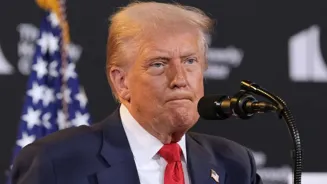US President Donald Trump has told Congress he will cancel $4.9 billion in foreign aid, using a rarely used budget tool called a “pocket rescission.” The
Trump administration’s Office of Management and Budget (OMB) announced that it plans to cancel billions in foreign aid, saying the spending does not align with the president’s “America First” priorities, as per CNN report. The proposed cuts include $3.2 billion from USAID development programs, $393 million from State Department peacekeeping operations, $322 million from the State Department’s Democracy Fund, and $444 million from other peacekeeping aid.
What Is Pocket Rescission?
A pocket rescission is a mechanism under the Impoundment Control Act that allows the President to propose canceling money already approved by Congress.
If Congress does not act on the proposal within a set time, the money can be blocked from being spent. This tool has not been used since 1977, when President Jimmy Carter tried it.
What Democrats Said
Rep Rosa DeLauro, the top Democrat on the House Appropriations Committee, said Trump was trying to “steal money that has been appropriated.” She said Congress must set stronger limits on presidential power in budget matters.
Sen Susan Collins, the top Republican on the Senate Appropriations Committee, also questioned the legality. She pointed to a Government Accountability Office (GAO) opinion saying pocket rescissions are not allowed under current law.
Senate Minority Leader Chuck Schumer added that the decision shows Trump and Republicans are unwilling to work with Democrats on bipartisan solutions, especially with a government funding deadline approaching.
Government Funding Deadline Nears
The dispute comes just weeks before the federal government runs out of money on September 30. Lawmakers must pass new funding to avoid a government shutdown. The White House has said it prefers a “clean” short-term spending bill, while Democrats have warned that Trump’s rescission attempt could make negotiations harder.
The Trump administration insists it is on “firm legal ground.” OMB Director Russell Vought, who has long pushed for stronger presidential control over spending, said that the President has the authority to act.
In a letter to Congress, Trump defended the cuts, saying the foreign aid programs are “woke and weaponized” and not aligned with his agenda.
The notification triggers a 45-day pause on the targeted funds. Normally, if Congress does not approve the cuts within that time, the money is released. But because Trump’s proposal was sent so close to the end of the fiscal year, the money may expire before Congress can act, effectively cancelling the aid.












